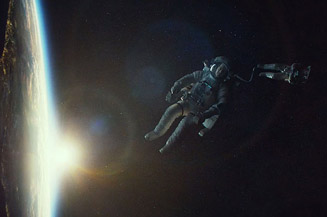|
|
Movie Review: GravityBy Edwin DaviesOctober 8, 2013
As was the case with Matt Reeves' handheld monster movie, Gravity only shows one perspective of a story that would more traditionally show many more. We know that the events in space would play out on the ground as well, with the friends and family of Stone and Kowalski, as well as the countless people transfixed as the disaster is related by the news, watching on helplessly, but we never see any of them. Cuarón's script, which he co-wrote with his son Jonás, leaves no room for that kind of external drama, and instead remains resolute in its focus on how the disaster impacts the two characters we can actually see, and how they react to it in turn. That myopia lends the film much of its power and gives it a refreshing leanness (Seriously, why is it rare that a hugely expensive, visually dazzling movie clocks in at an hour and a half?), but does highlight some of the aspects that don't work as well. Some of the dialogue is very awkward and clunky, though some of it can be contextualized as professionals just going about their job, and the constant stream of misfortune that befalls the characters can get a little aggravating after a while (though Stone herself expresses that exact same sentiment in the film), but it never gets boring. It's hard to quibble with these issues, which are incredibly minor in the face of what Alfonso Cuarón has achieved. Gravity is an astonishing cinematic experience, one that arguably functions best as a ride than as a narrative film, but it is one hell of a ride.
|

|
|
|

|
Friday, November 1, 2024
© 2024 Box Office Prophets, a division of One Of Us, Inc.


